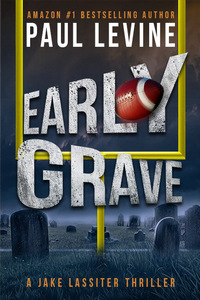 On Monday, I posted my take on Early Grave, the twelfth and final legal thriller featuring Jake Lassiter.
On Monday, I posted my take on Early Grave, the twelfth and final legal thriller featuring Jake Lassiter.
Back in 2020, when Paul Levine gave me a little of his time to participate in A Few Quick Questions, I wrote, “If you’d told me 20 years ago, that I’d get Paul Levine to respond to a handful of questions I asked him for a blog? I wouldn’t have believed you—but I’d think that was a great story.” And now, he’s back? This is too good.
According to his website, Levine “worked as a newspaper reporter, a law professor and a trial lawyer before becoming a full-time novelist. Obviously, he cannot hold a job. Paul claims that writing fiction comes naturally: he told whoppers for many years in his legal briefs.
His books have been translated into 23 languages, none of which he can read.”
Did you know going in that this would be Lassiter’s last case—or did you make that decision while writing? Have you had second thoughts about it? Has it settled in for you, or are you going to have to come to terms with this after publication? After all these years, I can’t imagine it’s that easy for you.
I’ve been living with that big galoot in my head for 33 years, and I know he’d never hang up his briefcase voluntarily. He even threatened to break all my fingers if I benched him, a pretty good trick for a fictional character. Yes, I knew it would be Lassiter’s last adventure…or misadventure. It felt right. He’d had his mediocre career with the Miami Dolphins. He’d fought for justice for decades, not always winning. Like so many of his teammates, he’s apparently suffering from CTE, the deadly brain disease. But you’re right. It wasn’t easy for me to say goodbye.
Based on what’s happening to Lassiter and the events of this book alone—is it fair to say that you have some pretty firm opinions on the state of football when it comes to safety? If so, did you develop these after you gave Lassiter his condition—or was it the other way around? Would you say you’re in line with Jake on this—or does life not imitate art at all here? I know it can be dangerous to try to assign motives to an author based on what his character says and does, but something about the writing here makes it feel more heartfelt.
I was sports editor of The Daily Collegian at Penn State and thought my career path was headed toward sportswriting. I love football. Always have. But, I’m not oblivious to the dangers in the sport. The NFL belatedly accepted the medical evidence that repeated blows to the head could cause a fatal brain disease. Lassiter rues the fact that six members of the Miami Dolphins’ undefeated 1972 team are dead of CTE. “Perfect season, my ass,” he says. One of my close friends, a former college football player and a rugby player for 25 years, died of CTE. I dedicated Bum Luck to him. All of this was long before Damar Hamlin’s injury shined the spotlight on dangers inherent in the sport.
Lassiter (and Solomon) spend a lot of time pushing ethical boundaries (when they don’t just ignore them). Sure, there’s a heightened and comedic reality at work here, but how do you balance that without turning readers against them? Is it their intentions, or something else? Have you found yourself having to change direction because one of them went too far.
In To Speak for the Dead, the first of the series, way back in 1990, Lassiter robs a grave to have a not-quite-legal autopsy performed. He suckers a witness into punching him out in the courtroom to prove the man’s propensity for violence. In Early Grave, he plays some courtroom tricks that aren’t necessarily kosher. But he’s generally on the right side of justice, so the moral issue is whether the means justify the ends. And I’m happy to let the readers decide that thorny issue.
I’ve seen Lassiter go up against prosecutors before, he’s a reliable David to go up against the Goliath of the State (or the Feds). But Sandra Day and the office of Wikerham and Snoot, make them seem like kittens in comparison. You didn’t take it easy on Lassiter at the end here, did you? Why’d you pick this kind of an opponent for him—or what it that given the topic of the book, you needed a private firm?
A long time ago, I was a partner in a 150 year old Philadelphia law firm. Now, there was no one as cutthroat as Sandra (Sunny) Day, but the firm did have enormous resources and could suffocate less well-funded opponents with an avalanche of paperwork and other fancy litigation tactics. I always want Lassiter to face enormous odds, whether it’s the U.S. Attorney’s Office with all the power of the Justice Department (Cheater’s Game) or a judge who’s either corrupt or incompetent (many books) or as here, a law firm that dates back to the Civil War.
Schooner Wickerham IV was an inspired choice, how on earth did you come up with him? Is he inspired by anyone in particular?
Schooner Wickerham IV is a throwback, a dinosaur, someone stuck in a time warp. He’s the privileged, to the manor born scion of a wealthy, powerful family. He’s obviously and casually misogynistic and racist and represents everything Lassiter despises. He thinks that power and money will carry the day in and out of court. Thankfully, he’s a dying breed, if not close to extinction.
What’s next for Paul Levine, author?
I’m working on a spec feature film script, a Hollywood period piece set in the 1930’s. Other than that, I take my pooch for walks on the beach and watch a LOT of football.
Thanks for your time and willingness to let me pester you with these questions—I really enjoyed Early Grave and hope that it finds the audience it deserves.
THANK YOU




2 Pingbacks